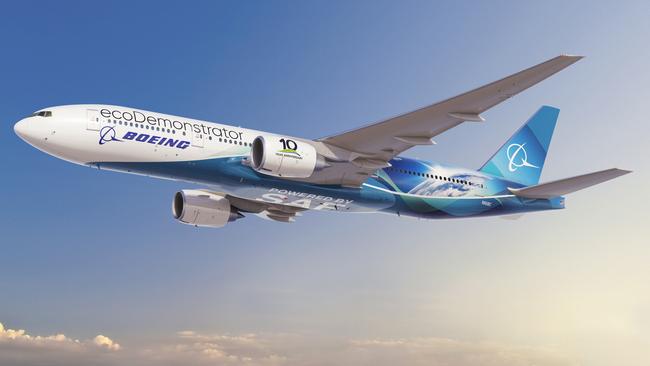How tobacco could light up the airline industry and slash carbon emissions
Smoking might be banned on aircraft but tobacco could one day be used to fire up engines minus the nasty emissions thanks to new Australian research.
Business
Don't miss out on the headlines from Business. Followed categories will be added to My News.
Smoking might be banned on-board aircraft but it’s a different story in the fuel tank where tobacco could one day help deliver emissions-free flying.
Research by the CSIRO in partnership with agricultural company Nufarm has found modifying the genetic make-up of tobacco plants can increase oil production in the leaves and stems.
CSIRO Futures associate director Max Temminghoff said the oil could then go on to be used to make biofuels – or sustainable aviation fuel (SAF) – considered the best pathway to emissions-free travel.
“The CSIRO is very much thinking of how we can alter the way we work in agriculture in Australia to bring multiple benefits away from the usual agricultural products,” said Mr Temminghoff.
Scientist Thomas Vanhercke said the technology was developed in response to the world’s need for production of plant oil, or biofuel, without impacting on food security. “We took the genetics for seed oil production and incorporated them across a range of crops with promising success,” said Dr Vanhercke.
Although the research was cause for optimism, precious little other progress has been made towards Australia becoming a SAF-producing country.
Despite having an abundance of the sort of raw materials needed for SAF including sugarcane, sorghum, cottonseed and tallow, Australia is yet to produce any of the green fuel considered the best chance of achieving the airline industry’s 2050 net zero target.

To date just a handful of projects have been announced, one of which has already been scrapped – in Gladstone – with others awaiting feasibility studies and/or further investment.
Mr Temminghoff said the risk of Australian feedstock being snapped up by other countries for SAF production was very real.
“We’re starting to see this where Australia is again at risk of being a bit flat footed and behind the eight ball so countries where there are (SAF) mandates in place are eyeing Australia and identifying that this is a really great place to develop feedstocks and potentially fuels,” Mr Temminghoff said. “We are seeing interest from different countries about whether it’s leasing our land to produce feedstocks or develop the fuels locally to meet their mandates overseas.”
That was already the case at Miriam Vale in Queensland, where Japan’s Idemitsu and J-Oil Mills has signed a deal with the Burnett Mary Regional group to jointly explore SAF output using pongamia oil.
Any production would benefit the aviation industry in Japan, where commercial airlines will be required to use at least 10 per cent SAF in their fuel mix from 2030.
The absence of any mandate or subsidy for SAF production in Australia was seen as a major restraint on the industry’s development particularly as other countries surged ahead.
A joint report by the CSIRO and Boeing titled the SAF State of Play showed the European Union plus a dozen other countries had either introduced or planned to introduce SAF mandates.
The US on the other hand was providing a tax credit of 53c for every gallon of SAF produced, as an incentive to refineries.
Boeing Australia, New Zealand and South Pacific sustainability lead Kimberly Camrass said they recognised it was impractical for governments to prop up a new industry indefinitely but clear policy settings were needed.
“It’s encouraging the federal government has made some significant policy signals through the May budget, and I think we’re starting to see that policy signalling reduce the investment risk,” Dr Camrass said. “Policy is the key to drive this forward, and we’re looking forward to 2025 to be more significant in terms of what those policies end up shaping up to look like.”
More Coverage
Originally published as How tobacco could light up the airline industry and slash carbon emissions





